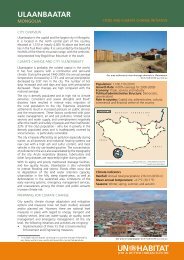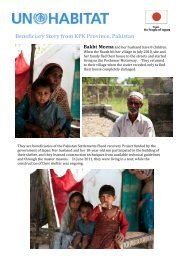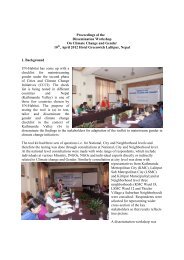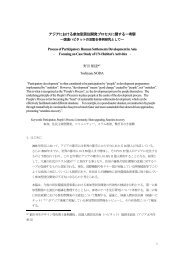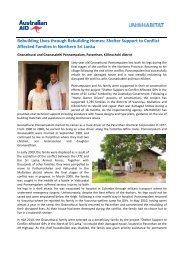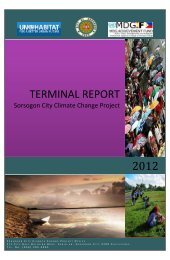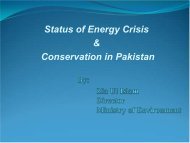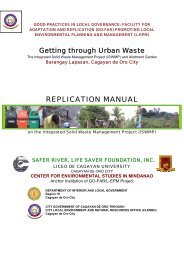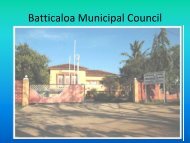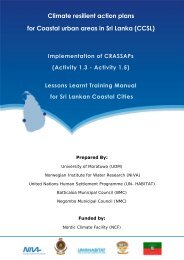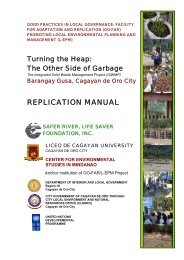Kotte Solid Waste Management Strategy
Kotte Solid Waste Management Strategy
Kotte Solid Waste Management Strategy
You also want an ePaper? Increase the reach of your titles
YUMPU automatically turns print PDFs into web optimized ePapers that Google loves.
Landfill is only the last resort: Currently, the city’s solid waste managementdepends solely on collection and disposal method. There is increasing difficulty infinding suitable landfill sites. Obviously, indiscriminate burying of recyclable material isa colossal waste of marketable resources. The strategy, therefore, treats waste as rawmaterial and an income source for the city. It will use the land fill technique only as thelast resort and, in its place, will promote alternative techniques to reduce, reuse andrecycle the optimum possible quantum of waste at the point of generation. The strategyalso proposes to use alternate methods to transform the landfill sites into Eco-parks forpublic use.Recognize the Informal sector as a vital partner: The urban informal sector is acritical part of the whole waste management system of the city. For the first time here, amunicipal strategy is recognizing the presence of the informal sector in SWM andproposing municipal assistance and facilitation of its operationsPeople need affordable solutions: The society seeks after easy solutionsconvenient and affordable to the individual and family. Changing their attitude and habitsis a formidable task. It can be done only by introducing innovative solutions that do notcall them to go out of their way and routine. Home level composting appears to be aneffective primary mode to meet this challenge. Home-based composting alone canprevent at least 60% of the household waste from being a municipal problem and anenvironmental hazard.Peoples’ participation: Social Mobilization for environmental care is animportant element of this strategy. It recognizes public education as an importantcorollary in the context of current socio-economic pressures and complexities. It alsoenvisages creating institutional methods to engage the city residents in municipalplanning and decision making. The strategy will mobilize School Environment Societiesas partners in this regard. The strong public opposition against landfill sites in urban areasand garbage transportation through their localities must be positively addressed toconvert such protest into social movement for home-level waste reduction , reuse andcomposting.Develop stakeholder partnerships: SJKMC is convinced that urban wastemanagement will be easier and more effective only if the local authority can developinstitutional mechanisms to promote sustainable partnerships with different stakeholdersof the city such as the residents, civil society organizations and the private sector.Administrative and institutional changes are vital: Several far-reachingadministrative and institutional arrangements are suggested to implement the newstrategy. In designing these arrangements, due caution and care have been taken in thisdocument to keep revisions to the minimum in order not to upset the existingadministrative arrangements too much. The proposed arrangements emphasize (a) the useof alternative technological options to reduce, reuse and recycle domestic waste, (b) theuse of community structures to ensure local area management that can create waste-freeenvironments, (c) institutionalization of the working group system at city and ward levels



